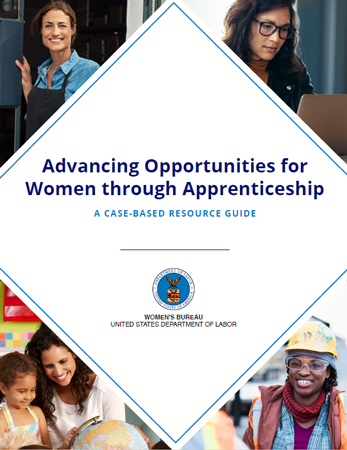Apprenticeships and nontraditional occupations are two often complementary pathways to good-paying jobs for women. Through apprenticeship programs, women can get paid work experience, classroom instruction and a portable, nationally-recognized credential. Apprenticeships are available in many fields and can prepare women for fulfilling careers, including in nontraditional occupations. Nontraditional occupations for women are defined as those in which women currently comprise 25% or less of workers. These tend to be higher-paid than occupations in which women comprise the majority of workers. Some examples include electricians, aircraft mechanics/technicians, and computer programmers.
The Women’s Bureau supports the recruitment and retention of women in apprenticeships and nontraditional occupations through several initiatives and resources.
Grants
Women in Apprenticeship and Nontraditional Occupations (WANTO) Grant
The Women in Apprenticeship and Nontraditional Occupations (WANTO) grant helps to expand pathways for women to enter and lead in all industries by recruiting, mentoring, training, and retaining more women in quality pre-apprenticeship and apprenticeship programs. Since 2017, the Women's Bureau has awarded nearly $26 million to 43 community-based organizations throughout the country that help women pursue apprenticeships and provide technical assistance to employers and labor unions to support women in apprenticeships and nontraditional occupations. Through quality apprenticeship and pre-apprenticeship programs, women have access to sustainable, successful, and high-paying careers in industries such as manufacturing, infrastructure, cybersecurity, and healthcare.
In 2024, the Women’s Bureau awarded $6 million to nine community-based organizations through the WANTO Grant Program in order to support women pursuing apprenticeships and nontraditional occupations.
Tradeswomen Building Infrastructure Grant
The Tradeswomen Building Infrastructure (TBI) grant furthers efforts to create pathways for women into building trades apprenticeships and public works construction careers. As billions of dollars in federal infrastructure and clean energy funding are directed toward state and local projects, thousands of well-paying jobs in construction and related industries are going unfilled. At the same time, special effort is needed to ensure that underserved groups, including women, have access to these jobs and the training to qualify for them.
In 2023, the TBI grant awarded $1.35 million to fund the State of Illinois to collect data on and evaluate existing workforce development programming designed to diversify the clean energy and infrastructure workforce. It will also fund Chicago Women in Trades to work with teams in four or five locations around the U.S. to build equity plans, promote their adoption, and guide the implementation of programming to increase women’s inclusion and equity.
Learn more about the TBI grant.
Tools for Building an Equitable Infrastructure Workforce: Gender Equity Strategies as a Model
The unprecedented levels of federal investment in infrastructure create a unique opportunity to design and implement policies and programs that will ensure equity and inclusion in good jobs that pay family-sustaining wages and meet the demand for workers on a wide range of infrastructure projects. This module provides guidance on strategies and best practices for recruiting and retaining women in construction, manufacturing, and clean energy jobs. This module can and should be used by a wide range of stakeholders. These strategies should be viewed as a menu of options and entry points that can and should be used to either initiate new projects and programs and fill the gaps for existing work, depending on their community and workforce needs.
Read the Tools for Building an Equitable Infrastructure Workforce toolkit.
Advancing Opportunities for Women through Apprenticeship: A Case-Based Resource Guide
In September 2020, the Women's Bureau published the Advancing Opportunities for Women through Apprenticeship case-based resource guide to provide a framework for meaningful expansion of apprenticeship programs for women. The guide includes case studies on four high-quality, women-inclusive pre-apprenticeship and apprenticeship programs in a range of industry sectors.
The case studies were developed through on-site visits to the program locations; interviews with program staff, partners, and current and former participants; and a review of program materials and data. They provide information and insights related to partnership development, program design, and outcomes that outline how pre-apprenticeship and apprenticeship programs can help women access family-sustaining jobs and quality career pathways. The guide identifies common strategies across the four programs to help others learn how to create programs that successfully open pathways to in-demand jobs for women through apprenticeships.
Read the Advancing Opportunities for Women through Apprenticeship guide.
Blogs
- The Power of Second Chances for Women Who Served Their Time (April 2024)
- 5 Ways Construction Employers Can Create Safer Workplaces for Women (March 2024)
- The Fast-Growing Number of Black Women Apprentices (February 2024)
- How Historic Infrastructure Investments Can Advance Equity in the Labor Force (November 2023)
- Using Grants to Promote Gender and Racial Equity in the Workforce (September 2023)
- Gender and Safety at Work (August 2023)
Videos
- Acting Secretary Su: Hope Renovations visit (June 2024)
- Women’s Bureau Ride-Along with Driver Brita Nowak discussing Sexual Assault in Trucking
- Kaniya Washington on the benefits of apprenticeships (June 2024)
- Acting Secretary Su: Chicago Women in Trades visit (May 2024)
- Tamia Mack on Apprenticeship (May 2024)
- What can an apprenticeship do for you? (November 2023)
- Here's what Acting Secretary Julie Su has been up to (September 2023)




